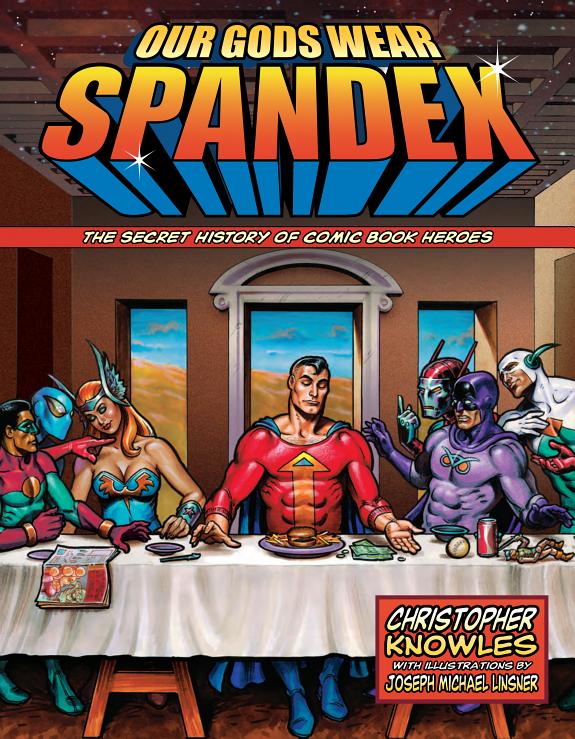Our Gods Wear Spandex: The Secret History of Comic Book Heroes by Chris Knowles, published in 2005, is not your typical comic book history. Knowles, known for his deep dives into esotericism and fringe culture, doesn’t simply chronicle the rise of superheroes. Instead, he presents a compelling, often unsettling, argument that these caped crusaders are modern-day incarnations of ancient archetypes and occult forces. This book, far from a simple geeky indulgence, tackles how these modern myths have infiltrated our collective consciousness, making its themes eerily relevant in our current media-saturated world. Amazon Link
Knowles starts by tracing the roots of superhero figures back to pagan gods and folkloric figures. He doesn’t just mention these parallels; he meticulously details them, showing how the powers and stories of figures like Thor or Superman align with older myths. This isn’t a dry academic exercise but rather a thrilling exploration of how ancient stories echo through modern narratives. He paints a convincing picture of how these archetypes, once worshipped, now walk among us in spandex and capes. The book’s structure is a journey, moving chronologically from the pre-superhero era to the modern comic book, showing how those ancient ideas evolved. It’s designed to build the case that comic heroes are not mere fictional characters, but living embodiments of potent symbolic forces.
The book is meticulously researched, drawing from a wide range of sources including mythology, occult studies, and comic book history. Knowles’s expertise in the esoteric gives the analysis a weight that few other books in this area possess. He’s not just a fanboy; he approaches the subject with an analytical eye, making connections that many overlook. Knowles argues that the stories we read in comics, and the heroes we admire, are not just entertainment, but a continuation of a long line of archetypal narratives that shape human consciousness. This is a concept that is both fascinating and a bit unnerving to consider. Amazon Link
One of the most striking aspects of Our Gods Wear Spandex is how it frames the superhero narrative within a larger cultural context. Knowles delves into the symbolism and hidden meanings behind the superhero personas, exploring how these figures embody our collective anxieties and aspirations. This isn’t simply a history of comic books; it’s an examination of how myths continue to shape our reality. He explores the psychological power of these figures, how they can become both ideals to emulate and even objects of worship, mirroring the way gods were viewed in ancient times. He touches on the occult symbolism and subliminal messaging that can be found within the stories, prompting a deeper reflection on the impact of mass media.
The book really shines when it connects these comic book characters to modern cultural phenomena. Knowles doesn’t shy away from exploring the darker side of these narratives, questioning the impact of such powerful imagery on our collective psyche. He points out how these heroes, while seemingly benevolent, also represent unchecked power, raising questions about our own relationship with authority. It’s not just about the fun of superheroes; it’s about the real-world implications of the myths we consume. The idea that what we read and watch shapes our collective consciousness, both for better and for worse, made me consider what stories I chose to engage with, a personal insight that I never considered until reading Knowles.
Knowles’s writing style is accessible and engaging, even for those who might not be familiar with the subject matter. He skillfully blends historical facts with insightful commentary, making the book a compelling read from start to finish. The pacing is excellent, never dragging as he weaves through the different layers of history and analysis. He avoids jargon, making it easy to follow even the most complex arguments. His voice is that of a guide, leading the reader through a fascinating journey. Amazon Link
While the book is primarily a deep dive into the symbolism and esoteric connections behind superheroes, it also functions as a compelling history of the comic book industry. Knowles traces the origins of the medium, highlighting the influences that shaped the characters we know and love. He touches on the evolution of comic book storytelling, showing how these characters have reflected and influenced our culture over the decades. This isn’t just a theory-driven analysis; it’s also a well-researched historical account. Knowles demonstrates that the rise of superhero comics is not an isolated phenomenon, but a result of cultural and historical forces.
Our Gods Wear Spandex is not for those who simply want a light, fluffy history of comic books. It’s a book that challenges your perceptions and invites you to question the narratives that shape our world. The book is suitable for those interested in mythology, occult studies, media criticism, or anyone seeking a deeper understanding of the cultural impact of superheroes. It is for those who seek to think beyond the surface of the stories we consume. It may not convince everyone, but it will definitely spark a conversation and make you look at your favorite heroes in a different light. Amazon Link
In conclusion, Our Gods Wear Spandex is a thought-provoking and illuminating read that transcends the typical genre of comic book history. It’s a powerful exploration of how ancient myths continue to resonate in our modern world. The book left a lasting impact on me, making me see not just superheroes, but all stories, as part of a larger, more powerful narrative. I would highly recommend it to anyone interested in a deeper look at the origins of modern mythology. Readers who enjoy works by authors like Joseph Campbell or Carl Jung will find this book particularly compelling. It is a must-read for anyone seeking a more profound understanding of the cultural forces that shape our world and our stories.

